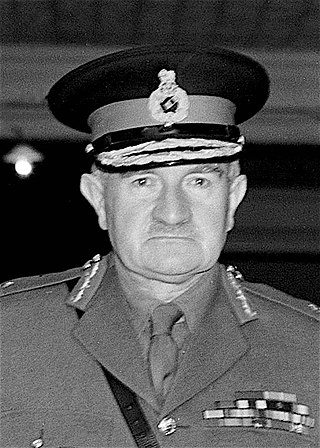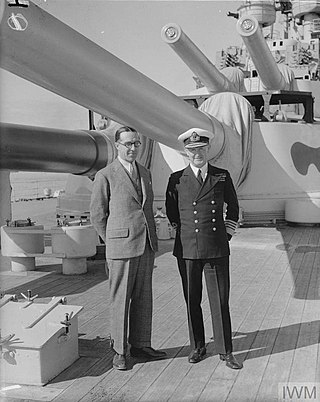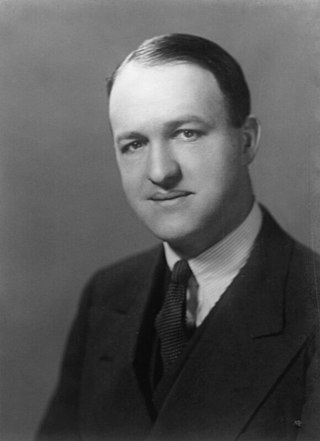Related Research Articles

Field Marshal Sir Claude John Eyre Auchinleck, was a British Indian Army commander who saw active service during the world wars. A career soldier who spent much of his military career in India, he rose to become commander-in-chief of the Indian Army by early 1941 during the Second World War. In July 1941 he was appointed commander-in-chief of the Middle East Theatre, but after initial successes, the war in North Africa turned against the British-led forces under his command, and he was relieved of the post in August 1942 during the North African campaign.

Stanley Baldwin, 1st Earl Baldwin of Bewdley, was a British statesman and Conservative politician who dominated the government of the United Kingdom between the world wars. He was prime minister on three occasions, from May 1923 to January 1924, from November 1924 to June 1929, and from June 1935 to May 1937.

Field Marshal John Standish Surtees Prendergast Vereker, 6th Viscount Gort, was a senior British Army officer. As a young officer during the First World War, he was decorated with the Victoria Cross for his actions during the Battle of the Canal du Nord. During the 1930s he served as Chief of the Imperial General Staff. He is best known for commanding the British Expeditionary Force that was sent to France in the first year of the Second World War, only to be evacuated from Dunkirk the following year. Gort later served as Governor of Gibraltar and Malta, and High Commissioner for Palestine and Transjordan.

Edward Frederick Lindley Wood, 1st Earl of Halifax,, known as the Lord Irwin from 1925 until 1934 and the Viscount Halifax from 1934 until 1944, was a senior British Conservative politician of the 1930s. He held several senior ministerial posts during this time, most notably those of Viceroy of India from 1926 to 1931 and of Foreign Secretary between 1938 and 1940. He was one of the architects of the policy of appeasement of Adolf Hitler in 1936–1938, working closely with Prime Minister Neville Chamberlain. After Kristallnacht on 9–10 November 1938 and the German occupation of Czechoslovakia in March 1939, he was one of those who pushed for a new policy of attempting to deter further German aggression by promising to go to war to defend Poland.

The governor-general of India was the representative of the monarch of the United Kingdom in their capacity as the emperor/empress of India and after Indian independence in 1947, the representative of the monarch of India. The office was created in 1773, with the title of governor-general of the Presidency of Fort William. The officer had direct control only over his presidency but supervised other East India Company officials in India. Complete authority over all of British territory in the Indian subcontinent was granted in 1833, and the official came to be known as the governor-general of India.

Richard Colley Wellesley, 1st Marquess Wellesley, was an Anglo-Irish politician and colonial administrator. He was styled as Viscount Wellesley until 1781, when he succeeded his father as 2nd Earl of Mornington. In 1799, he was granted the Irish peerage title of Marquess Wellesley of Norragh. He was also Lord Wellesley in the Peerage of Great Britain.

John Allsebrook Simon, 1st Viscount Simon, was a British politician who held senior Cabinet posts from the beginning of the First World War to the end of the Second World War. He is one of three people to have served as Home Secretary, Foreign Secretary and Chancellor of the Exchequer, the others being Rab Butler and James Callaghan.

The Royal Military College (RMC), founded in 1801 and established in 1802 at Great Marlow and High Wycombe in Buckinghamshire, England, but moved in October 1812 to Sandhurst, Berkshire, was a British Army military academy for training infantry and cavalry officers of the British and Indian Armies.

Field Marshal William Joseph Slim, 1st Viscount Slim,, usually known as Bill Slim, was a British military commander and the 13th Governor-General of Australia.
The order of precedence in Scotland was fixed by Royal Warrant in 1905. Amendments were made by further Warrants in 1912, 1952, 1958, 1999 to coincide with the establishment of the Scottish Parliament and Scottish Government and most recently in 2012.
An unofficial order of precedence in Northern Ireland, according to Burke's Peerage, 106th Edition, this is not officially authorised by or published with authority from either Buckingham Palace or the College of Arms, or the Home Office, the Ministry of Justice or the Northern Ireland Office (NIO) of His Majesty's Government in the United Kingdom, or the Northern Ireland Assembly, or the Northern Ireland Executive.

The Most Exalted Order of the Star of India is an order of chivalry founded by Queen Victoria in 1861. The Order includes members of three classes:
- Knight Grand Commander (GCSI)
- Knight Commander (KCSI)
- Companion (CSI)

Frederic John Napier Thesiger, 1st Viscount Chelmsford,, styled the Lord Chelmsford until 1921, was a British statesman. He served as Governor of Queensland from 1905 to 1909, Governor of New South Wales from 1909 to 1913, and Viceroy of India from 1916 to 1921, where he was responsible for the creation of the Montagu–Chelmsford Reforms. After serving a short time as First Lord of the Admiralty in the government of Ramsay MacDonald, he was appointed the Agent-General for New South Wales by the government of Jack Lang before his retirement.

Walter Turner Monckton, 1st Viscount Monckton of Brenchley, was a British lawyer and politician.

Thomas Walker Hobart Inskip, 1st Viscount Caldecote, was a British politician who served in many legal posts, culminating in serving as Lord Chancellor from 1939 until 1940. Despite legal posts dominating his career for all but four years, he is most prominently remembered for serving as Minister for Coordination of Defence from 1936 until 1939.

Henry David Reginald Margesson, 1st Viscount Margesson, PC was a British Conservative politician, most popularly remembered for his tenure as Government Chief Whip in the 1930s. His reputation was of a stern disciplinarian who was one of the harshest and most effective whips. His sense of the popular mood led him know when to sacrifice unpopular ministers. He protected the appeasement-supporting government as long as he could.
The Indian Empire Society was a London-based lobbying organization, formed in 1930 to promote the cause of the British Empire in India.

George Sydenham Clarke, 1st Baron Sydenham of Combe, was a British Army officer and colonial administrator.

When the United Kingdom declared war on Nazi Germany in September 1939 at the start of World War II, it controlled to varying degrees numerous crown colonies, protectorates, and India. It also maintained strong political ties to four of the five independent Dominions—Australia, Canada, South Africa, and New Zealand—as co-members of the British Commonwealth. In 1939 the British Empire and the Commonwealth together comprised a global power, with direct or de facto political and economic control of 25% of the world's population, and of 30% of its land mass.

Richard Austen Butler, generally known as R. A. Butler and familiarly known from his initials as Rab, was a prominent British Conservative Party politician.
References
- Stewart, Graham (1999). Burying Caesar: Churchill, Chamberlain and the Battle for the Tory Party. Phoenix. ISBN 978-0753810606.
- Cowling, Maurice (2005-09-08). The Impact of Hitler: British Politics and British Policy 1933-1940. Cambridge University Press. ISBN 978-0521019293.